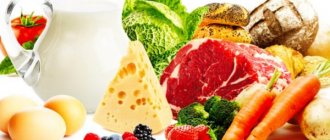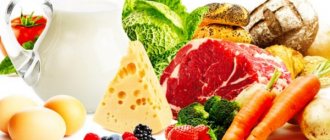HOW MUCH PROTEIN DO WOMEN NEED?
So how much protein should women consume? Numbers vary depending on the source. According to the Centers for Disease Prevention and Control, the standard recommended intake for the average person is approximately 46 grams of protein per day for women and 65 grams per day for men. [5]
Keep in mind that this is the recommended dose for a person who spends most of their time sitting. If you exercise and strain your muscles, you should increase your protein intake. Likewise, if you are dieting and getting fewer calories from carbohydrates and fats, you need to increase the amount of macros you consume from proteins.
People who only exercise and are not dieting should consume about 0.8 to 1 gram of protein per 0.45 to 0.5 kilogram per day. If you eat right and exercise, you need to consume 1 - 1.5 grams of protein per 0.45 - 0.5 kilograms per day. If you are reducing your calorie intake, be sure to increase your protein intake. Keep this in mind when building your diet.
Focus on consuming high-quality protein sources such as chicken, fish, lean red meat, eggs, low-fat dairy products and high-quality whey protein.
Protein content in food
The source of protein can be both products of plant origin and protein - the whole question is in the speed and quality of absorption, as well as in the amino acid composition.
So, drumbeat, a list of products is coming into the arena, the addition of which we strongly recommend considering adding to your diet.
| The product's name | Protein content |
| Tuna | 33g/100g product |
| Chicken meat | 30g/100g product |
| Shrimps | 22g/100g product |
| Quinoa | 20g/100g product |
| Almond | 20g/100g product |
| Salmon | 20g/100g product |
| Mutton | 16g/100g product |
| Eggs | 13g/100g product |
The effect of protein on the body of training women
There is also an interesting study from the Performance Enhancement Lab at the University of South Florida, where they looked at the effects of varying amounts of protein in the diet on the body and endurance of exercising women. [6]
The study involved two groups of women who followed a strength training plan and a resistance training program for 8 weeks . The program consisted of two parts: two training days for the upper body, and two days for the lower body. Half of the women ate a high-protein diet and the other half ate a low-protein diet.

The high protein group consumed 1.1 grams of protein per pound of body weight, including 25 grams of whey protein before and after each workout. The second protein group consumed 0.55 grams of protein per pound of body weight, including 5 grams of whey protein immediately before and after exercise. Each day, participants consumed a certain amount of protein, but were allowed to eat as many carbohydrates and fats as they wanted.
V závere štúdie sa ukázalo, že ženy, ktoré konzumovali väčšie množstvo bielkovín získali podstatne viac svalovej hmoty (cca 2.8 kg) v porovnaní so skupinou, ktorá konzumovala menšie množstvo bielkoví n (0.68 kg). Skupina, ktorá konzumovala viac proteínu, stratila viac telesného tuku ako skupina s nižšou dávkou bielkovín , hoci táto zmena nedosiahla žiadnu štatistickú významnosť.
What is the effect of proteins according to the study?
While these results aren't shocking, they do confirm what we already know: if women, especially those who exercise intensely, consume more protein, they are likely to gain more muscle mass than women who consume less protein.

However, the following fact may surprise you. On average, women with high protein intake consumed an additional 423 calories each day from protein . Therefore, it can be assumed that someone who consumes an additional 400-500 calories per day for eight weeks will easily increase their fat levels; however, this did not occur in this study.
Women in the higher protein intake group lost a greater percentage of body fat than women in the lower protein intake group , even though they were consuming more calories! Specifically, the higher protein group lost 1.08 kg of fat compared to the second group, which lost just 0.77 kg.
This was the first study to include only women who exercise. However, similar results can also be observed in other studies involving men or men and women together . Research from Nova Southeastern University has shown that consuming 500 to 750 calories daily from protein sources, especially protein, does not increase body fat levels. [7],[8] In contrast to the current study, participants who consumed more protein did not see as significant changes as in this study.

Due to these results, this may mean that women actually respond better to higher protein intake to increase muscle mass than men. However, this is just a theory that needs to be confirmed by further research.
Stop looking at the scales
You've probably already heard the phrase, "Don't worry about what your scale says," and now you have a good reason to pay attention. If previous studies had controlled for body weight, women in the higher protein intake group would have realized that they had gained just over 0.9 kg. And for women this is a rather frightening fact.

However, the study was conducted by experts and scientists who assessed the condition of the body, not just body weight. They found that the higher protein group gained more muscle and lost more fat than the lower protein group—so you won't see all the results on the scale.
Let's look at the changes - fat loss and muscle growth . If you find that your weight has increased, but your fat percentage has decreased, know that what you did was right and good! It can also be helpful to take pictures of your progress, pay attention to how you feel in certain clothes, or monitor your energy levels in the gym.
Conclusion
If your goal is to gain muscle mass and reduce fat percentage, you will probably think about a high protein diet and intense training. So what is our recommendation? Women should consume about 2 grams of high-quality protein per kilogram of body weight to improve body condition and maximize regeneration. So feel free to consume protein shakes or just add chicken breast to your salad!
Ladies, how many grams of protein do you consume per day? Share your answers in the comments. If you liked this article and found it useful, please support us by reposting.
Protein metabolism
The processes of digestion of this class of organic compounds begin in the stomach: all the ideal conditions are created here, including an acidic environment that ensures proper secretion of hydrochloric acid, and several types of proteolytic enzymes, each of which works within its own pH limit.
Absorption, as well as carbohydrates and fats, occurs on the villi of the small intestine, where they are evacuated after a certain amount of time, sufficient for mechanical grinding by a powerful muscle layer, as well as chemical treatment through gastric juice.
Much more fascinating is the fact that our body is capable of producing peptides on its own - in a huge, multifunctional factory called the liver. In particular, plasma albumins and globulins are synthesized here. The former have several vital effects:
- Maintaining internal balance - homeostasis, or more precisely: regulation of the distribution of extracellular fluid between the vessels and their surrounding tissue.
This function is carried out through the formation of oncotic pressure - and these two terrible words contain enormous significance for the normal functioning of any of our systems.
The thing is that protein molecules are hydrophilic - in simple words, they adore water, and, therefore, they strive in every possible way not only to hold it in their arms, but also to scoop up more of it. Thus, being in the vascular bed, they are eager to take it away from the tissues that surround the arteries and veins - and if this happens (which is usually observed in pathology, when the oncotic pressure indicator in the blood vessel increases), dehydration will develop or , in the language of science, dehydration.
- Participate in the formation of one of the buffer systems
, which prevents the very shift in acid-base balance (pH) towards acidosis or alkalosis.
Affect ESR
- erythrocyte sedimentation rate.
However, in fairness, it is worth noting that hypoalbuminemia, that is, a decrease in the concentration of this protein fraction, is observed not only with a decrease in the synthetic function of the liver, but also accompanies a number of other clinically important disorders:
- Violation of absorption processes
and, as a consequence, insufficient supply of amino acids.
- Increasing their losses
- for example, with ulcers of the gastrointestinal mucosa and various types of enteropathies. This is also observed when kidney function is impaired - or more precisely, when their glomerular filter is damaged. Imagine a sieve that filters water and very small molecules that can squeeze between the tiny cells. But when the sieve turns into a colander, and its thin, delicate structure is covered with crater holes, then plasma proteins get into the primary urine along with blood cells.
- Malnutrition
. Plasma proteins are also interesting from a pharmacological point of view: after all, they are the ones that bind medicinal substances, thereby turning them into an inactive fraction. And the stronger this connection is, the longer it lasts, the more pronounced the cumulative (cumulative) effect of the drug is because, as was previously explained, it cannot be excreted in the urine in a similar state.
Thus, the study of proteins and their effect on the human body is a whole unplowed field for scientific work and reflection - and for the latter, you will agree, there are many prerequisites and reasons.
Minimum amount of protein in the diet
An approximate calculation can show how much protein our body needs to renew existing tissues. The cells of all muscle tissue are completely renewed in 16 years at an average weight. For a weight of 80 kilograms in an athletic person, we have a muscle mass of approximately 45 kg, and 20% of this mass is 9000 g of protein, the regeneration of which requires that our body synthesize a minimum of 1.5 g of protein per day. In addition to replacing aging muscle cells, such as when exercising, additional protein will be needed to restore the integrity of damaged muscle fibers.
Table from the book of Zbarsky B.I. "Biological chemistry "
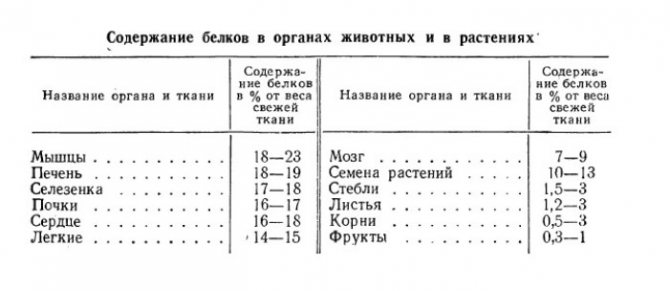
Table No. 2. Ratio of NAC to total protein in food
The table shows the ratio of NAC to other amino acids in foods.
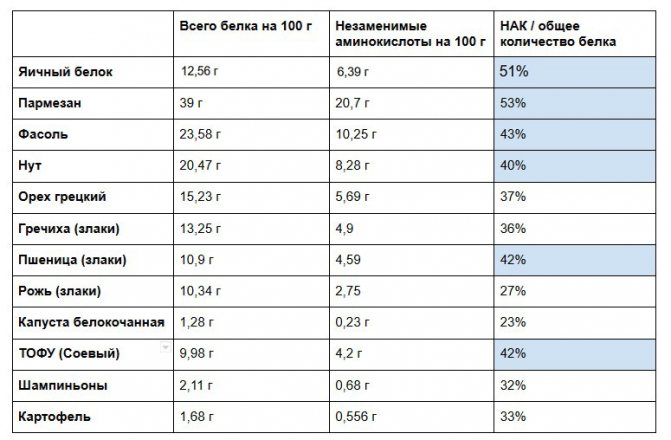
For normal muscle growth for a training athlete, protein intake should naturally be higher than the minimum values mentioned. At the same time, there are limits to metabolic processes and there are a number of studies suggesting that consumption of more than 1.6 grams per kilogram of body weight per day (in absolute terms, this is 128 grams for an 80 kg person) does not produce muscle gain in training athletes.
Table No. 3. Ratio of NAC to product cost
According to WHO, the minimum value of NAC, in absolute value equal to 14.7 grams for a person weighing 80 kg or 100% of the daily value of a complete amino acid profile for a person weighing 80 kg, can be obtained from the following foods:
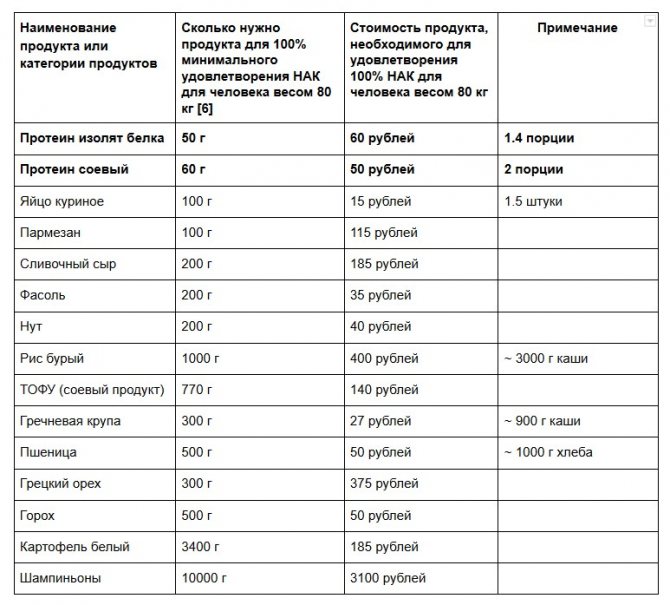
The values in this table may be misleading because they are based on the consumption of one food item. If you combine different foods , you will get a more complete diet.
For example , 200 grams of buckwheat grains (dry weight) and 200 grams of tofu will have 100% amino acid profile. Since (Methionine + Cysteine) in 200 grams of tofu there is only 26% of the daily value for a person weighing 80 kg , and in 200 grams of buckwheat there are 66% of the daily value (Methionine and Cysteine).
Should you consume protein from sports nutrition?
If you don’t have enough protein from natural foods in your diet or find it difficult to get enough from solid foods, then you can safely and without harm to your health use protein powders.
Protein powders may have benefits:
- In terms of cost per gram of protein compared to whole foods and below, you will see this.
- The second advantage is the low fat and carbohydrate content per serving.
- Sports nutrition has a long shelf life, which is important.
- Easier control of protein intake - the manufacturer describes the composition of each serving on the packaging and includes measuring cups.
- Protein shakes are liquid and easier to consume than solid foods.
Be careful when mixing the powder with milk, juice, yogurt, or anything else. In addition to protein, you will get the nutrients and energy from milk, juice, yogurt, etc. Consider the total calorie content of the resulting cocktail.
Powdered protein is conventionally divided into two types: casein and whey protein. Both products contain all essential amino acids in sufficient quantities, but whey protein is quickly broken down and absorbed in the intestine, and casein is slowly. There is also plant-based soy protein.

Whey protein comes in several forms: concentrate, isolate and hydrolysate. They differ not only in the method of production, but also in the composition of proteins, lactose and milk fat.
Isolate is a product with a protein content of up to 97%. Hydrolyzate - already broken down amino acids, the rate of absorption is higher than that of isolate, but not by much (no more than a few minutes), and the advantage of rapid absorption is not always better. The hydrolyzate is suitable for people with protein absorption disorders. The concentrate (more often called simply “whey protein”) contains 25-89% protein, lactose and milk fat. It is cheaper and more accessible than other types.
Your task is to get the protein itself, and the speed of its absorption is not so important for the average person who wants to be healthy and look good. The recommendation here, as with food, is to focus on the cost of 1 g of protein in such supplements and choose what will be more profitable for you.
Let's compare popular protein powders in terms of cost per gram of protein.
Let's take Optimum Nutrition 100% Whey Gold Standard whey concentrate.
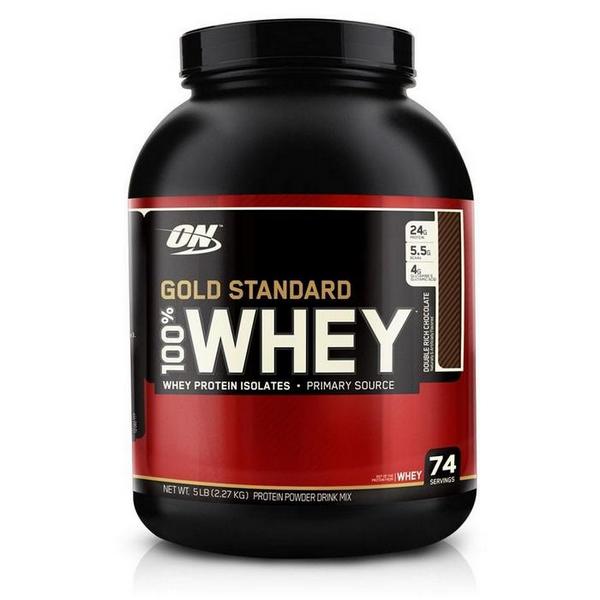
The protein content in it is 80 g per 100 g of product, the cost of 900 g of the mixture is about 2000 rubles. 100 g of the supplement will cost 222 rubles, the cost of 1 g of protein will be approximately 2.8 rubles .
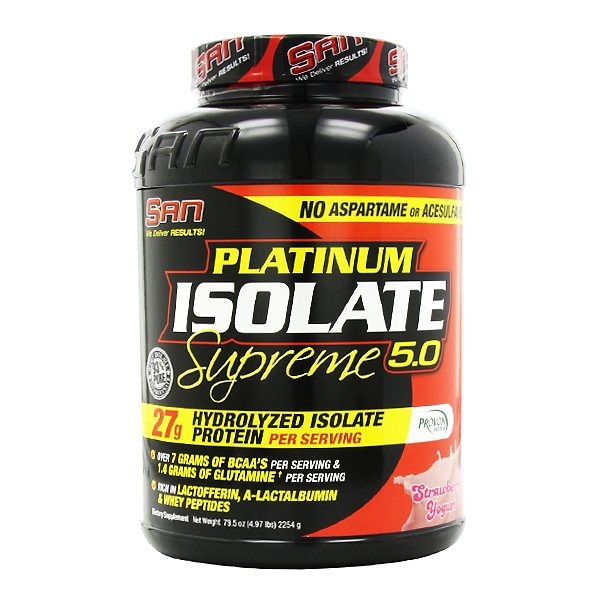
SAN Platinum Isolate Supreme isolate costs 5,300 rubles for 2,250 g of product; a serving of the product weighing 30.1 g contains 27 g of protein. It turns out that a serving costs 71 rubles, and 1 g of protein will cost 2.65 rubles .
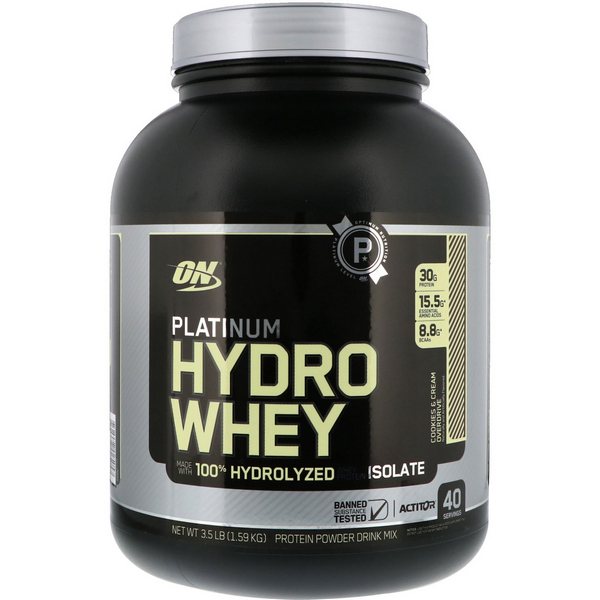
Optimum Nutrition Platinum Hydro Whey hydrolyzate – the cost of a 1600 g can is about 4700 rubles. A 39g serving contains 30g of protein. In terms of price, it will cost 114 rubles. 1 g of protein will cost 3.8 rubles .
I took the prices from Yandex Market and rounded them for clarity of calculations. In my case, isolate turned out to be even more profitable than concentrate. I would safely take it if I lacked protein in my diet.
How to Take Isolate, Concentrate, Casein, or Other Protein Powders
- We determine our daily protein requirement (more on this above).
- We determine how much protein we lack in our diet (I wrote about how to count proteins, fats and carbohydrates here).
- We calculate how much protein you need to get from the supplement and measure out the portion.
- We use it in the form of a cocktail with water, milk, juice, yogurt, or add it to cottage cheese or another product and thus reach our norm.
Animal proteins
Animal products contain the highest amount of protein per weight compared to plant products.
Red meat
- Beef;
- Mutton;
- Ostrich meat.
The fat content of red meat depends greatly on the origin of the cut. Lean red meat is an excellent source of protein, zinc, iron, creatine and vitamin B12 with minimal fat content.
Pork
- Bacon
- Ham
- Tenderloin
- Other parts of pork
This is an excellent protein, the only minor disadvantage of pork is that some pieces are very fatty.
Bird
- Chicken;
- Turkey;
- Duck;
- Goose.
Thigh meat may contain a significant amount of fat, while breast meat is virtually fat-free, requiring only the skin to be removed.
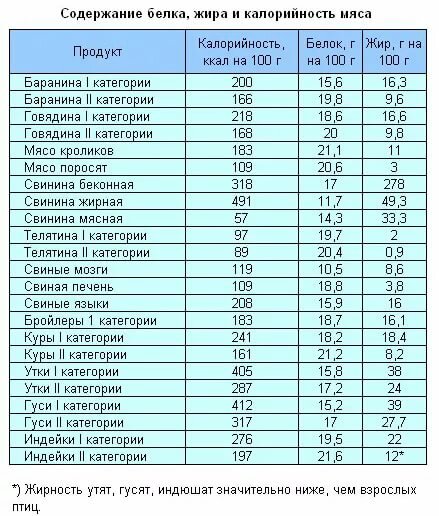
Fish and seafood
Protein from fish is of excellent quality, although many types of fish contain very little fat. Fatty fish typically contain most of their fat from omega-3 fatty acids, making them extremely beneficial for health and athletic performance.
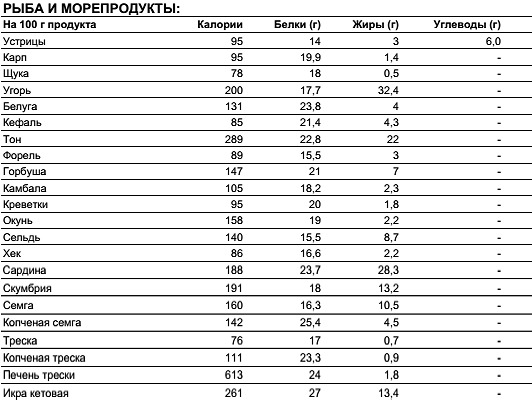
However, the benefits of fish may be counterbalanced by increased mercury levels in certain species. Be careful when choosing.
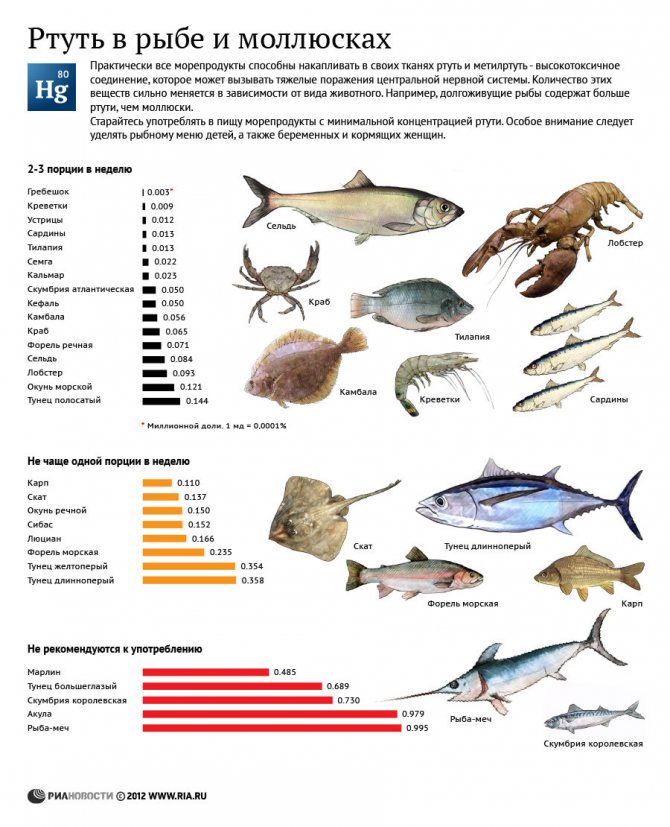
Eggs
Eggs have received an undeservedly bad reputation due to concerns about their saturated fat and cholesterol content. However, the relationship between dietary cholesterol intake and blood cholesterol levels is simply not observed in most people. Moreover, blood lipids change for the better and whole eggs contain large amounts of other health-promoting nutrients.
What you should pay attention to is the fat content of your serving of eggs, but you certainly don't have to worry about dietary cholesterol.
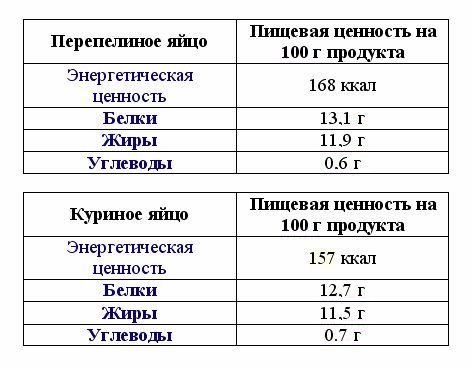
Dairy
- Milk;
- Yogurt;
- Cheese;
- Cottage cheese;
- Ice cream;
- Kefir;
- Condensed milk;
- Powdered milk.
Cow's milk protein is of very high quality due to its good amino acid profile - large amounts of valine, isoleucine and leucine (the same BCAA). High levels of leucine intake during dieting may stabilize blood glucose levels and improve fat-to-muscle ratio. In addition, protein high in the amino acid leucine has the added benefit of promoting satiety - this will have a positive effect on appetite and calorie intake.

Sour dairy products benefit from the presence of probiotics: live cultures that improve the health and function of bacteria present in the human gut.
Another benefit of milk is that it is an excellent source of calcium in the diet.
Choose dairy products carefully, because... they contain a significant amount of fat, but now the food industry offers low-fat cottage cheese, milk and other products. They don't taste as good, but they make it easier to keep track of your fat and calorie intake.
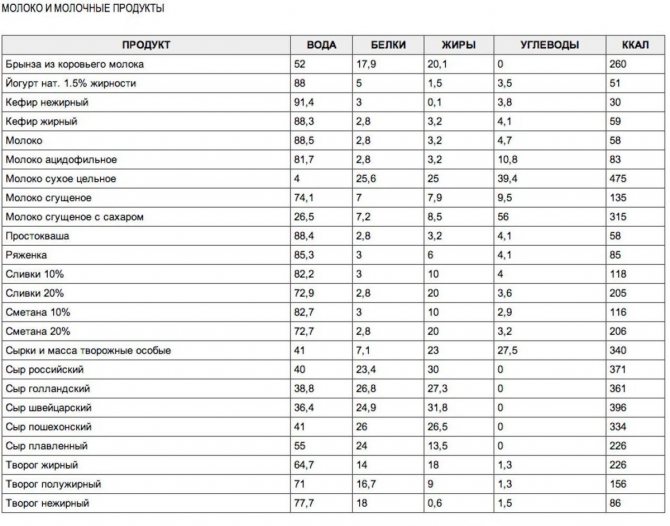
Protein and Weight Loss

A high protein diet can help you lose weight. Research has shown that protein increases satiety. Moreover, while your body is working to digest protein, it is also burning calories.
Consuming 1.2-1.6 grams of protein per 1 kg of body weight will help you maintain muscle mass even as you reduce your total calorie intake.
Why do the human body need proteins?
Proteins are responsible for the growth and restoration of all cells and tissues in the body, and also perform a number of functions in metabolic and protective processes. In fact, muscles, organs, skin, hair, nails, bones, certain hormones and much more contain some amount of protein. In addition, protein is a supplier of essential amino acids , which are necessary for the body, but cannot be synthesized in it. They must come from food.
Thus, from a health, function, and vitality perspective, it is critical to eat an adequate portion of protein foods each day. More detailed information about the role of proteins in the human body is described in this section of Wikipedia.
But what to do with tasks such as losing weight or gaining muscle mass? What role do proteins play in these cases?
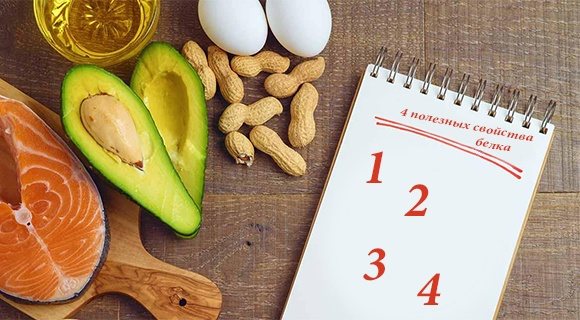
Is it safe for your health to eat so much protein?
Yes, it's safe!
There is a large number of studies that protein consumption in the amount of 2.8-3.3 grams per 1 kilogram of body weight does not have a negative effect on the body and is absolutely safe for healthy adults.
Main exceptions
The main exception is people with kidney disease. In these cases, protein intake should be limited to a certain extent, which can only be determined by a doctor.
But for average adults with healthy kidneys, available research shows that a high-protein diet is safe and effective for gaining and maintaining muscle mass, weight loss, diabetes, healthy bones, blood pressure control, and more.
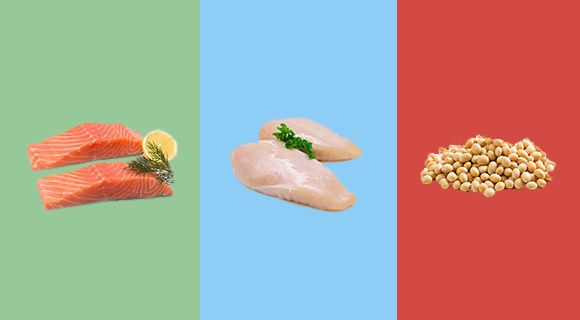
When is the best time to eat protein foods?
There are several answers to this question. Let's start with the most important.
The best time to eat protein is when you need it to achieve your ideal daily protein intake.
The most important thing is to eat the right amount of total protein. The same goes for calories, carbohydrates and fats. The overall intake of nutrients throughout the day is always much more important than the time at which they are consumed.
However, there are several times during the day when it is better to eat protein foods. At the top of this list is pre- and post-workout eating.
Additionally, getting enough protein in each meal , so spreading your intake evenly throughout the day is probably the most effective way to get the maximum benefit for you.
This doesn't mean you have to eat 6 times a day , or every 2 hours , or anything like that. Just whatever you choose, 3 or 6 meals a day, or anything in between, it would be ideal to eat the right amount of protein at each meal.
However, the total amount for the day is always much more important than anything, so you need to be free to choose your diet so that it is as comfortable and long-term as possible. After all, everyone has their own daily routine!

What is the best source of protein?
Now that you know how much you should eat daily, you might want to know which foods are best for getting protein. Here is a list of the most common, high quality products:
- Chicken breast;
- Turkey breast;
- Fish (for example, tuna, salmon, etc.);
- Beef (the less fatty, the better);
- Pork (the less fatty, the better);
- Eggs;
- Scourge squirrels;
- Protein supplements (eg whey protein powder);
- Dairy products (low-fat/skim milk, cheese, yogurt).
This doesn't mean this is the entire list of protein foods, but it does include the most common and high-quality sources.
I recommend that you read the material about the best sources of protein for effectively building muscle and reducing the percentage of body fat.
Choose your favorites/or those that you tolerate best.
For example, if you have trouble digesting dairy products, don't eat them.
Personally, I get most of my daily protein intake from chicken, turkey, eggs, and protein powder. These are my preferred/best tolerated sources. Find yours and do the same.

How much protein should you eat within the ideal range?
Based on all the information available today, to obtain the maximum beneficial effect of proteins, the optimal option is the range of 1.7-2.8 g.
That's why almost every science-based nutrition expert recommends an option that falls within this range.
There are people who claim that there is a certain amount of protein that suits everyone. However, it is not.
Why? There are two reasons.
- First , the available research is not strong enough to make such a precise statement. Believe me... if it were so, they would know about it. But no. The minute changes occur, I will come back and update the recommendations in this article. Until then, the range is as specific as possible.
- Secondly , because different people have different nutritional needs and preferences. For example, some people simply prefer to eat more or less protein than others (and you need to make your diet as optimal as possible to be able to stick to it). In addition, some people find that eating a protein at the midrange or high end helps them control hunger better than the low end of that range, while others find it simply too difficult, expensive, or inconvenient to eat more than the low end. Therefore, this amount varies.
As it turns out, there is no universal “best” amount for everyone, and a range like this is the best recommendation I can give you.
How much protein within the range should you consume? Whatever you want.
You should eat any amount of protein foods from this range each day that best suits your personal needs and preferences, thereby making the diet as optimal, enjoyable, convenient and long-lasting as possible. It's simple.






